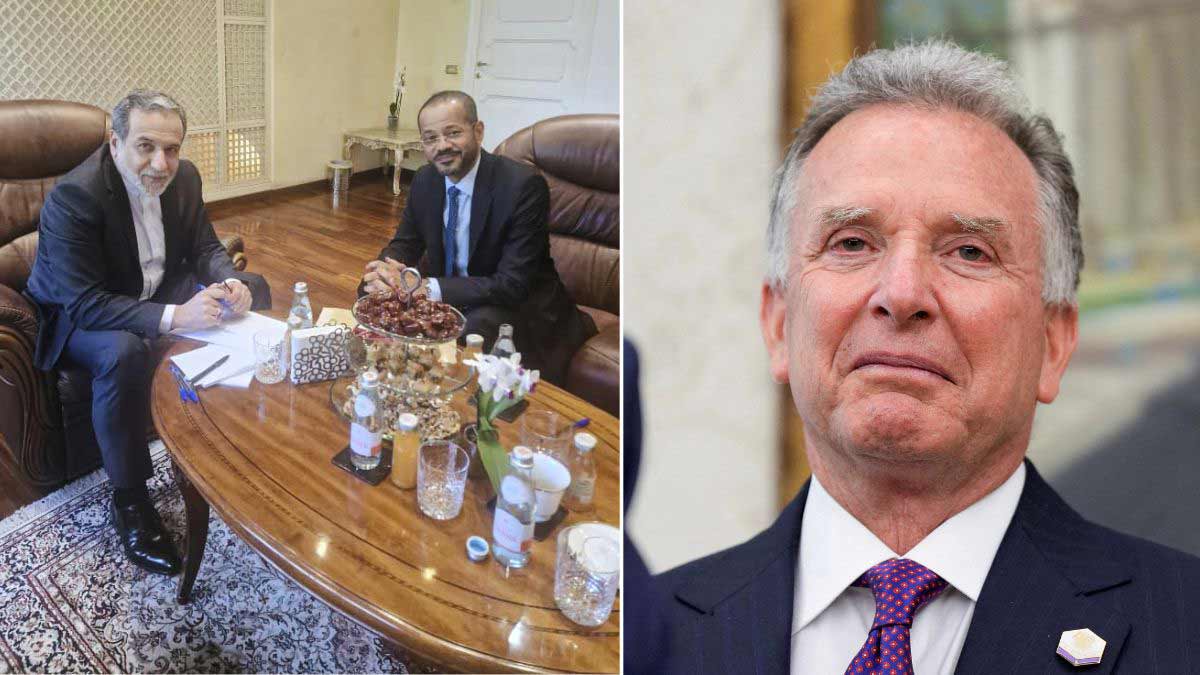Iran-US nuclear talks: Fifth round ends without agreement, but negotiations to continue
 Iranian Foreign Minister Abbas Araghchi (left) meets his Omani counterpart Sayyid Badr Albusaidi at the Omani Embassy in Rome | AP; US Special Envoy Steve Witkoff | Reuters
Iranian Foreign Minister Abbas Araghchi (left) meets his Omani counterpart Sayyid Badr Albusaidi at the Omani Embassy in Rome | AP; US Special Envoy Steve Witkoff | Reuters
The fifth round of indirect nuclear talks between Iran and the United States concluded in Rome yesterday without a formal agreement, but also without the feared collapse in negotiations. The discussions, mediated by Oman and held at the Omani Embassy in the Camilluccia neighbourhood, represent the highest-level contact between the two adversaries since the US withdrew from the 2015 nuclear accord under President Donald Trump. At Rome, the US was represented by Trump’s Middle East envoy Steve Witkoff and the State Department’s Policy Planning Director Michael Anton, and Iran by Foreign Minister Abbas Araghchi.
Omani Foreign Minister Badr al-Busaidi, who served as the principal mediator, said the negotiations had achieved “some but not conclusive progress”.
Talks began in April and have grown increasingly complex as the two sides remain entrenched in their positions. The United States is demanding a complete halt to uranium enrichment inside Iran, while Tehran insists its right to enrich uranium domestically is non-negotiable. This divergence has emerged as the most significant obstacle to progress.
Araghchi echoed this sentiment after the talks, telling state media that while the negotiations were “too complicated to be resolved in two or three meetings”, he remained cautiously optimistic. “Given the better understanding of the Islamic Republic’s positions, we can reach solutions that allow the talks to progress,” he said, describing the latest round as “one of the most professional” so far.
Despite this optimism, two Iranian sources told western media that hopes for a breakthrough were fading. They criticised what they described as Washington’s inflexible stance, stating that insisting on zero enrichment in Iran reflects a lack of genuine commitment to diplomacy. “From the perspective of decision-makers in Tehran, when the US knows that accepting zero enrichment is impossible and yet insists on it, it is a sign that the US is fundamentally not seeking an agreement,” the sources said.
The Trump administration has hardened its position in recent weeks, issuing fresh sanctions and warning of military action, should diplomacy fail. The State Department announced new restrictions targeting Iran’s construction sector, identifying it as being under the control of the Islamic Revolutionary Guard Corps (IRGC), and imposing curbs on 10 strategic materials allegedly used in Iran’s nuclear and ballistic missile programmes. Iran’s Foreign Ministry denounced the move as “unlawful and inhuman,” accusing the US of acting in bad faith.
Meanwhile, signs of regional escalation loom. Israel, which has long opposed any Iranian nuclear capability, has reportedly begun preparing for potential strikes on Iranian facilities. A senior US official confirmed Washington had obtained intelligence suggesting Israel was actively drawing up such plans. In an interview with CNN, US Ambassador to Israel Mike Huckabee hinted that under certain conditions, the US could support Israeli military action, stating, “I can’t imagine the US would object to a sovereign nation defending itself against what they perceive as a legitimate threat.”
This has further fuelled Iranian suspicions. Tehran no longer views American diplomacy as independent of Israeli influence, especially after Witkoff met with senior Israeli officials, including Mossad chief David Barnea and Netanyahu confidant Ron Dermer, just before and during the Rome talks.
Despite the hardening rhetoric, both sides appear reluctant to walk away from the table. A senior US official, speaking anonymously, characterised the negotiations as “constructive,” noting that “further progress” had been made but that “there is still work to be done.”
The negotiations seek to limit Iran’s nuclear activity in return for relief from crippling US economic sanctions. Internally, Iran faces mounting pressure. The economy remains fragile, the currency plummeted past 1 million rials to the dollar in April, and unrest over domestic issues such as the hijab mandate and fuel subsidies is simmering.
One proposal under discussion involves creating a regional consortium, supported by the US and neighbouring countries, to supply Iran with low-enriched uranium for peaceful purposes. However, Iran has firmly rejected suggestions that enrichment be conducted outside its borders, recalling a similar proposal that failed in 2010.
Iranian officials have also grown increasingly vocal in defending their nuclear facilities. Araghchi warned that Iran would take “special measures” should Israel continue threatening its nuclear infrastructure. In a symbolic move, a human chain of students was formed around the Fordo underground facility, built deep within a mountain to withstand airstrikes.
While the talks ended inconclusively, both Iran and the US have signalled a desire to keep diplomatic channels open. However, with positions hardening and regional tensions rising, the path to a sustainable agreement remains perilously narrow. The time and venue for the next round of talks have not yet been announced.
Middle East